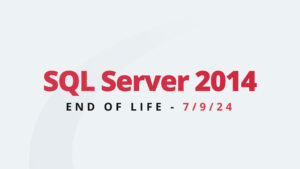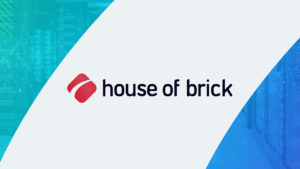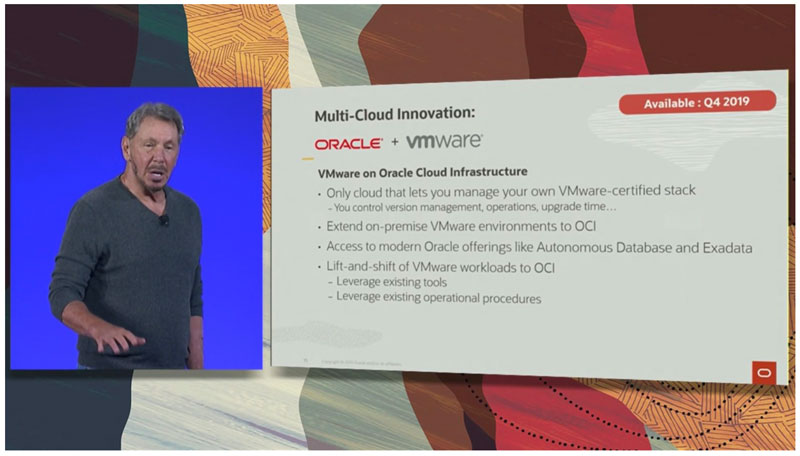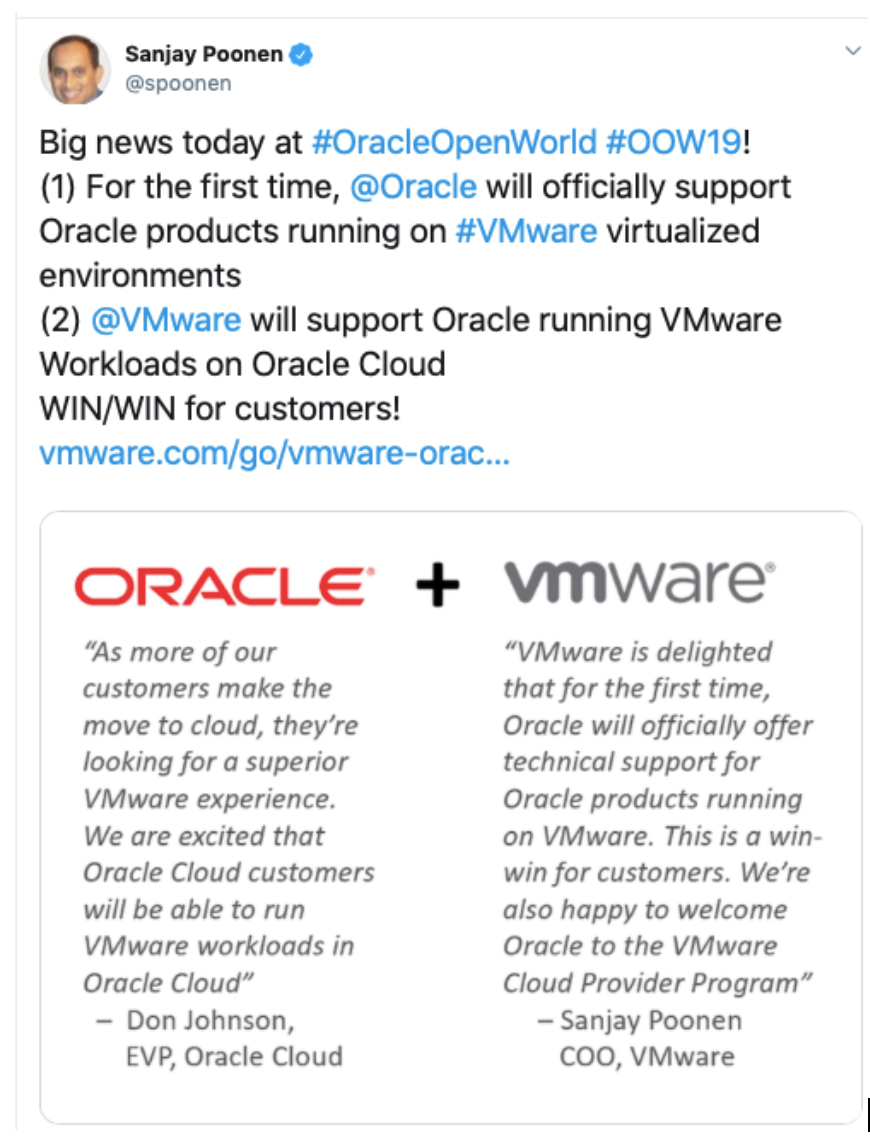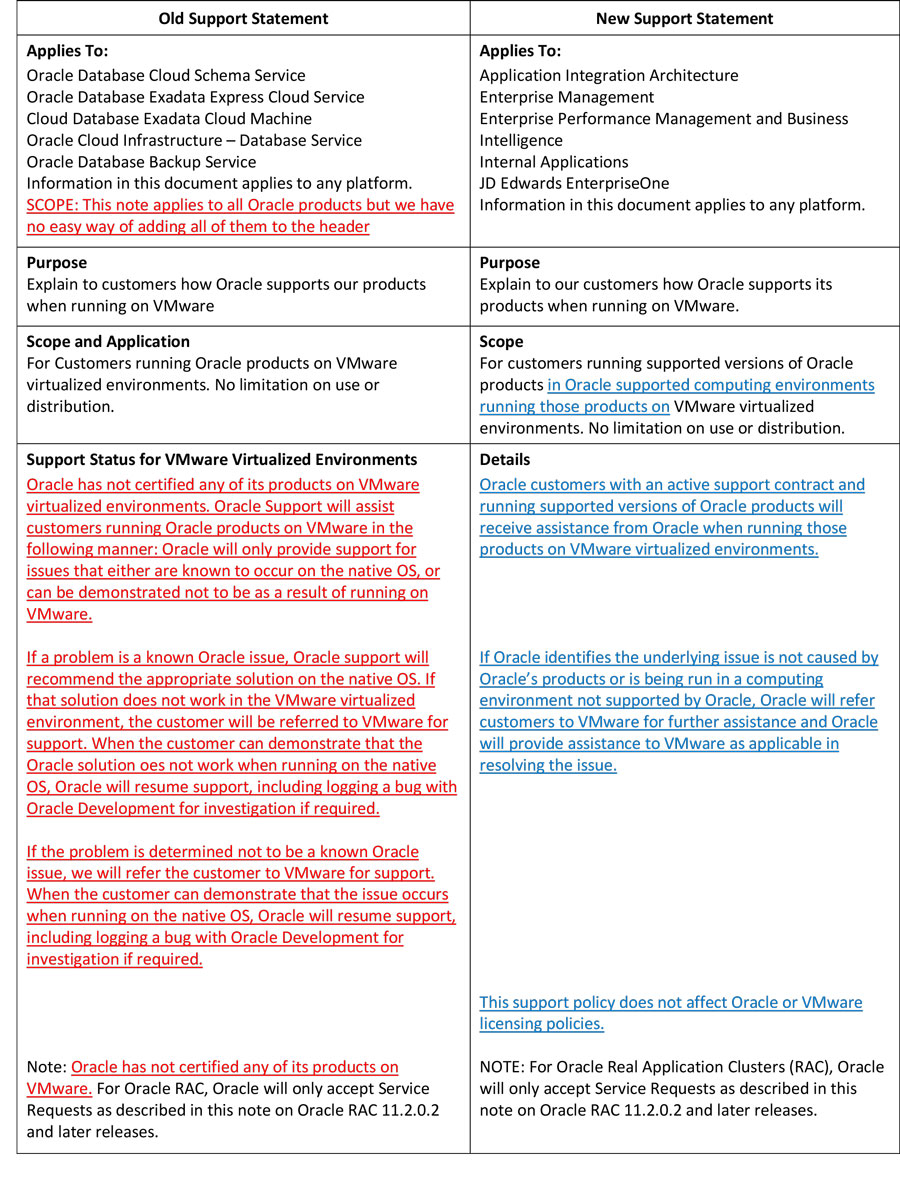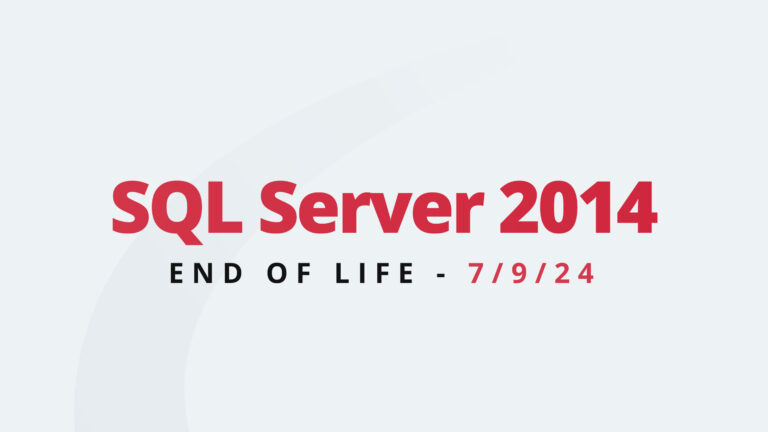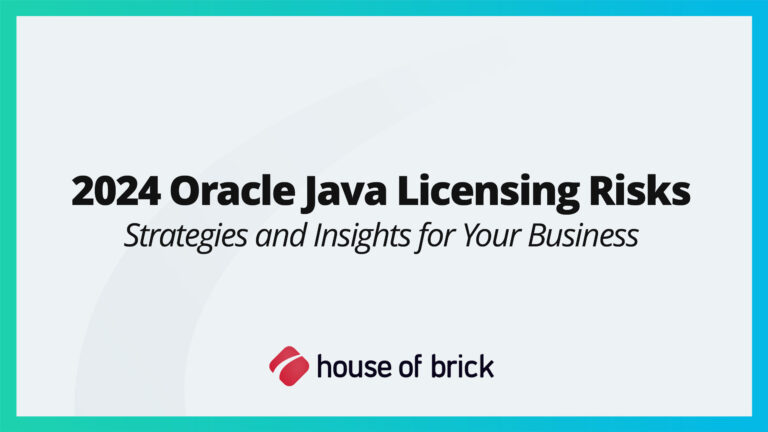Nathan Biggs (@nathanbiggs), CEO
In his first Oracle Open World keynote address in 2019, Larry Ellison made an announcement that few outside the inner circle of VMware and Oracle considered possible. Just prior to showing the slide in the image below, Larry Ellison said that the slide on their cloud growth would be “one of the two most shocking slides I have got here.” I can only assume that the next slide he showed about VMware was the other most shocking. Larry announced that Oracle and VMware had entered into a partnership to enable support for their joint customers’ hybrid cloud strategies. There were two main components to this landmark partnership:
- The announcement of the Oracle Cloud VMware Solution. This will enable customers to run their VMware-virtualized Oracle software stacks in the Oracle Cloud Infrastructure (OCI).
- Oracle will offer enhanced technical support for their products running on VMware in any Oracle supported computing environment.
Soon after the official announcement, Sanjay Poonen, VMware’s COO tweeted the following:
While I appreciated Sanjay’s enthusiasm for the announcement, I was initially put off by the wording in his referenced quote, “…for the first time Oracle will officially offer technical support for Oracle products running on VMware.” My reticence was due to the fact that our clients have received productive technical support from Oracle for more than a decade, based on the previous Oracle support policy from VMware (249212.1 in My Oracle Support). Admittedly, the wording of the support policy (perhaps intentionally) caused some fear due to the potential need to re-platform onto “native OS” to receive support. In our experience at House of Brick however, the level of support actually provided by Oracle never justified the fear. Since 2006, our clients have been successfully running all Oracle products on VMware, and getting the technical support they needed.
Just this week, as promised in the initial press release, Oracle updated their 249212.1 support policy for VMware. Now that I have read the new policy and compared the old language to the new language, I can see where Sanjay was coming from in his “for the first time” statement. For your benefit, I am comparing the old and new language side-by-side in the table below. While I do not expect the level of support from Oracle to improve dramatically, the changes in the policy wording are long-overdue, and warmly-welcomed. I have marked key additions in the new policy in Blue and key deletions from the old policy in Red. You will note that the details of the old language are largely marked out. I will comment on the impact of these changes below.
Note, the text of the old and new support policies was taken entirely from a blog post from VMware’s Sudhir Balasubramanian.
Here are the key deletions from the old policy that you should consider:
- The language claiming the “Oracle has not certified any of its products on VMware” has been completely removed from the policy. While this never caused any particular issue for our clients, it was something that made them question Oracle’s commitment to supporting them. Please note that the new policy does not indicate that their software is now certified. It simply remains silent on the point. Again, this has never been an issue for our clients, and will not become one now that Oracle has removed the language completely.
- The three-paragraph discourse on the so-called “native OS” and the need to demonstrate problems on a platform other than VMware has thankfully been removed. In our experience, this was a demand that was rarely, if ever, requested by Oracle support. It is nice, nonetheless, to have the confusion removed.
Here are key additions to the new policy that you need to be aware of:
- The clear and unambiguous statement about support for Oracle software on VMware is terrific, “Oracle customers with an active support contract and running supported versions of Oracle products will receive assistance from Oracle when running those products on VMware virtualized environments.” As I said before, I do not expect the actual level of support from Oracle to increase commensurate with the fervor of the announcement, but it is nice to not have fear-inducing language included in the policy.
- I was quite impressed with the next addition to the policy that states, “Oracle will provide assistance to VMware as applicable in resolving the issue.” This, to me, may be the most significant addition to the whole policy. To acknowledge that Oracle will cooperate with VMware (and not simply ignore the problem until VMware does something about it) demonstrates a real spirit of partnership between Oracle and VMware. I applaud both organizations for their considerable efforts to develop this level of amity for the benefit of their mutual customers.
- The final addition, however, is quite telling regarding Oracle’s claims about how to license Oracle software when it is running on VMware. If you have followed House of Brick’s blog posts or conference presentations for any amount of time, you will be well-versed in Oracle’s overreach when it comes to their licensing policies. As of vSphere 6, which allows vMotion capabilities throughout the entirety of the organization’s VMware farm, Oracle has claimed that every VMware host, regardless of whether it has Oracle software installed and/or running on it or not, must be licensed for their software. This claim has been debunked by House of Brick repeatedly and consistently across hundreds of actual Oracle audits, but the overreach remains. Please do not be bullied into license purchases that are unnecessary, or in creating convoluted Oracle environments that add complexity to your IT operations. If you have questions about licensing Oracle on VMware, please reach out and we will help.
Finally, a comment on the benefits that Oracle and VMware most likely stand to gain from this partnership. VMware clearly is trying to be the industry’s default choice for cloud foundation technology, regardless of which public provider is used. With the Oracle Cloud addition, VMware’s Cloud Foundation is now available on all six public clouds referenced in Gartner’s 2019 IaaS magic quadrant, including Alibaba, AWS, Google, IBM, Oracle, and Microsoft Azure. This is a clear win for them, and establishes VMware as the cloud foundation leader.
The question then becomes, “how does Oracle benefit from this partnership?” It is my opinion that Oracle actually needed this partnership more desperately than VMware did. Oracle’s cloud strategy has been struggling, with growth seemingly coming only through acquisition (NetSuite) or through the aggressive nature of their software audits. I believe that Oracle has realized that the majority of their customers are now using VMware technology to run their Oracle software. This was a smart move by Oracle to assuage their FOMO, and to provide a viable option for their customers to consider as they develop a cloud strategy.
My congratulations go out to VMware and Oracle for facilitating these long overdue changes, and for fostering cooperation between two of the most important enterprise software companies in the world.
